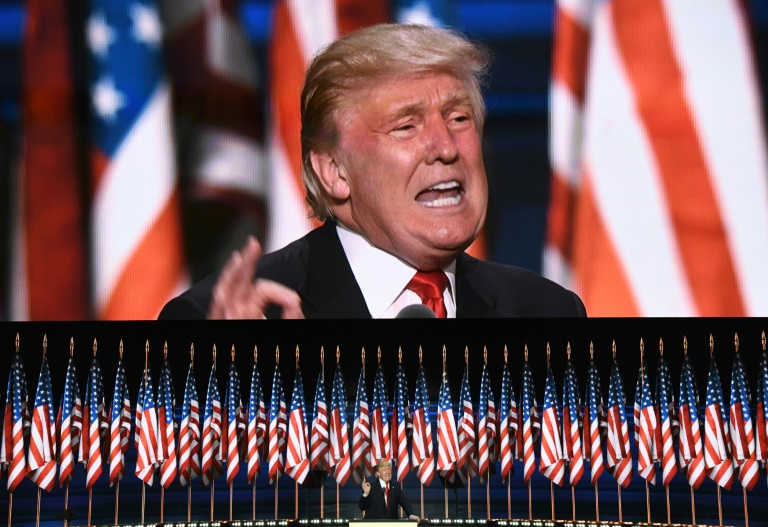Trump's praise of Russia raises 'national security issues': Clinton
 |
| Democratic Presidential candidate Hillary Clinton pictured in Las Vegas on Jul 19, 2016. (AFP/John Gurzinski) |
Trump, her Republican rival in the race for the White House, responded defiantly, saying that he had "no relationship" with Russian leader Vladimir Putin and had never met nor spoken to him by phone, but that "if our country got along with Russia, that would be a great thing."
 |
| US Republican presidential candidate Donald Trump speaks on the last day of the Republican National Convention on Jul 21, 2016, in Cleveland, Ohio. (AFP/Jim Watson) |
He said in an ABC interview that he was not about to disavow it if Putin praised him as a "genius" (some Russian speakers say "colourful" was a better translation of the word).
But perhaps further fanning controversy, Trump added that as president he would at least consider acknowledging Russian sovereignty over Crimea, the Ukrainian territory that Russia annexed in 2014 in the face of widespread international condemnation.
"The people of Crimea, from what I've heard, would rather be with Russia," Trump said.
He said, however, that he was not involved in Republicans' softening of their platform language to remove a call to provide Ukraine with lethal weaponry.
The dispute over Russia is part of a broader disagreement over US engagement abroad, as Trump argues that a weakened America must retrench and demand greater contributions from its allies, while Clinton asserts that decades-old US commitments to foreign partners must be maintained.
BACKLASH OVER EMAILS
Clinton, in her comments, was responding on "Fox News Sunday" to allegations of Russian involvement in leaks of Democratic Party emails that embarrassed her on the eve of the just-ended Democratic national convention.
As that convention was underway, Trump urged Russia to find and release several thousand emails that disappeared from Clinton's private server while she was secretary of state.
"Russia, if you're listening," Trump said then, "I hope you're able to find the 30,000 emails that are missing. I think you will be mightily rewarded by our press."
That call, of a sort nearly unprecedented in US presidential politics, drew sharp rebukes from Democrats and some Republicans.
US cybersecurity experts said it raised questions about whether Russia had attempted to influence the American campaign in Trump's favour. Leaked emails published by WikiLeaks revealed the distrust of some key Democratic leaders of Bernie Sanders, Clinton's former rival for the Democratic nod.
Trump's seeming encouragement of Russian hacking, Clinton told Fox, "raises issues about Russian influence in our election."
"And for Trump to both encourage that and to praise Putin despite what appears to be a deliberate effort to try to affect the election, I think, raises national security issues."
'NOT TEMPERAMENTALLY FIT'
When an interviewer noted that Trump had claimed he was being sarcastic, Clinton replied: "If you take the encouragement that Russians hack into email accounts, if you take his quite excessive praise for Putin, his absolute allegiance to a lot of Russian wish-list foreign policy issues," it suggests that "he is not temperamentally fit to be president and commander-in-chief."
Trump had earlier unnerved NATO member nations by questioning the long absolute US commitment to defend any member of the Atlantic alliance should it be attacked by Russia.
In an interview with The New York Times just before the Republican convention, Trump said that if Russia attacked NATO member nations he would decide whether to come to their assistance only if he decided that they had "fulfilled their obligations to us."
Trump has also said he might withdraw US troops from European and Asian countries if they failed to pay more for American protection. "We are going to take care of this country first," he told The Times, "before we worry about everyone else in the world."
What the stars mean:
★ Poor ★ ★ Promising ★★★ Good ★★★★ Very good ★★★★★ Exceptional
Latest News
More News
- ASEAN states unite for future economic stability (March 06, 2025 | 10:41)
- Indonesia plans over 20 energy projects in 2025 (March 05, 2025 | 10:09)
- Bali to use “water taxi” to address traffic congestion (March 04, 2025 | 17:15)
- RoK, Thailand hold 4th round of economic partnership negotiations (March 04, 2025 | 16:48)
- Thailand busts illegal e-money firms (March 03, 2025 | 16:47)
- Thailand to repatriate thousands of scam centre workers from Myanmar (March 03, 2025 | 10:51)
- PM stresses need for ASEAN to embrace new technologies (February 26, 2025 | 17:30)
- The world's future belongs to the youth: PM (February 26, 2025 | 17:23)
- More than 200 foreigners rescued from Cambodian scam centre (February 25, 2025 | 16:06)
- New Zealand PM’s visit to tighten bonds with Vietnam: Ambassador (February 24, 2025 | 11:22)


















 Mobile Version
Mobile Version